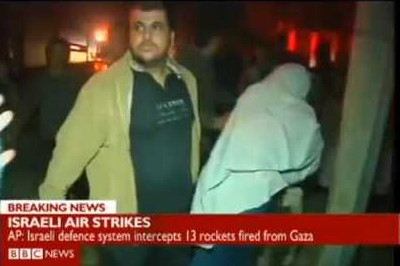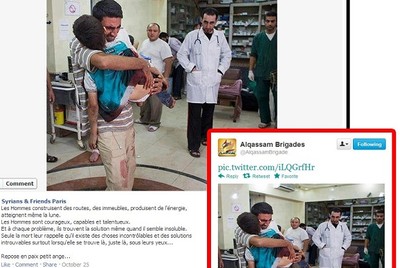An air force strike on Gaza
on Thursday. Dozens of Palestinian long-range rockets were destroyed in
the first wave of attacks.
|
Photo credit: AP 
Self-propelled 55 mm
artillery gun ready for action on the Gaza border on Thursday.
|
Photo credit: Reuters 
Chief of General Staff Lt.
Gen. Benny Gantz (right) with GOC Southern Command Maj. Gen. Tal Russo
in a war room near Gaza on Thursday.
|
Photo credit: IDF Spokesman's Unit 
Operation Pillar of
Defense entered its third day on Friday, and the Israel Defense Forces
were preparing for a ground assault in Gaza by calling up thousands of
reservists. The reservists will be joining the soldiers already moving
toward Gaza, after IDF Chief of General Staff Lt. Gen. Benny Gantz
instructed forces to accelerate preparations for a ground operation. So
far, 16,000 reservists have been sent voice messages telling them to
report for duty.
In the meantime, the IDF struck dozens of targets in Gaza from the air and sea on Thursday and well into Friday. During the day, the government denied reports of a cease-fire, with one senior official saying "There is no talk of that at this point. We are continuing the operation and not discussing an exit strategy."
Army Radio reported on Friday, however, that
Israel agreed to halt all offensive operations during a visit to Gaza by
Egypt's prime minister, Hesham Kandil. However, once rockets were fired
from the Strip, the temporary ceasefire was suspended.
On Friday, a ground assault seemed imminent as infantry, tank and artillery units amassed close to the Gaza border.
Prime Minister Benjamin Netanyahu held a
meeting with Defense Minister Ehud Barak and Foreign Minister Avigdor
Lieberman on Thursday and later met with Homefront Defense Minister Avi
Dichter, Israel Security Agency (ISA) chief Yoram Cohen and IDF Chief of
General Staff Lt. Gen. Benny Gantz, to discuss the situation in Gaza
and how to proceed with the operation.
The defense minister requested and received
approval from the government to call up a total of 30,000 reservists and
to prepare the military for a large-scale ground invasion of the Gaza
Strip.
The political-security cabinet and Foreign Affairs and Defense Committee authorized both Netanyahu and Barak to expand the offensive in Gaza as they saw fit. The committee was scheduled to meet again on Friday to receive updates on the situation and to make further decisions if necessary.
The political-security cabinet and Foreign Affairs and Defense Committee authorized both Netanyahu and Barak to expand the offensive in Gaza as they saw fit. The committee was scheduled to meet again on Friday to receive updates on the situation and to make further decisions if necessary.
As most of the long-range rockets Hamas
possessed before the operation were destroyed by air strikes on the
first day of the offensive, government officials expressed doubt on
Thursday of Hamas' ability to launch missiles at the central Gush Dan
region. One official said they may have a limited capability to fire
such missiles and the possibility is being taken into account by the
relevant authorities. It is clear, he said, that Hamas will try to score
some morale-boosting points by firing missiles at Tel Aviv.
"The prime minister's instructions are to hit them hard and prepare for an expansion of the operation," the official said.
Despite the assessments, however, an IDF
spokesman confirmed on Thursday night that three Iranian-made Fajr-5
missiles had in fact landed not far from Tel Aviv in an apparent attempt
by Palestinian groups to make good on their promise to strike the city
during the conflict. The missile launches triggered sirens throughout
Tel Aviv and Bnei Brak but no injuries or damage were reported in the
incident. Netanyahu heard the sirens himself during his visit to the
Kirya, the IDF's General Staff headquarters in Tel Aviv.
Former Defense Minister MK Binyamin Ben-Eliezer (Labor) remarked on the situation on Friday, saying that the operation in Gaza must continue in its current form. Ben-Eliezer told Israel Radio that he believed the operation was achieving its objectives.
Former Defense Minister MK Binyamin Ben-Eliezer (Labor) remarked on the situation on Friday, saying that the operation in Gaza must continue in its current form. Ben-Eliezer told Israel Radio that he believed the operation was achieving its objectives.
"Besides the assassination of Ahmed Jabari, an
achievement in and of itself, many weapons stores were destroyed,"
Ben-Eliezer said. "We mustn't stop until they realize in Gaza that the
rules of the game have changed and that Israel will no longer live with
the regular violence-truce-violence routine."
Officials in the Prime Minister's Office
expressed satisfaction over U.S. President Barack Obama's support for
Netanyahu and the operation on Wednesday. Netanyahu spoke with Obama on
the phone, with the president agreeing that Israel has the right to
defend itself. British officials echoed Obama's support.
The American president also spoke with
Egyptian counterpart Mohammed Morsi and asked him to do all he could to
prevent an escalation of the situation, which apparently prompted Morsi
to send Kandil to Gaza in an attempt to broker a cease-fire.
U.N. Secretary-General Ban ki-Moon is also
seeking a way to end the conflict and is scheduled to arrive in Israel
next week to discuss the matter with Netanyahu, Lieberman and Barak. He
will also meet with Palestinian Authority President Mahmoud Abbas.
Netanyahu also spoke with Russian President
Vladimir Putin and expressed his dismay at a statement by Russian
officials calling Israel the "aggressor." Netanyahu discussed the
situation with other world leaders as well, including French President
Francois Hollande and Canadian Prime Minister Stephen Harper.
Meanwhile, IDF units began moving southward,
amassing near the Gaza border. Troops belonging to the paratroopers,
Givati and Kfir brigades, as well as tank units and division staff
commanders streamed to the south in preparation for a possible ground
assault in Gaza..
Officers of the Gaza Brigade and Southern
Command held meetings on Thursday to assess the situation and confirm
their plans should a green light be given to enter Gaza.
Local and foreign media outlets covered the
buildup of forces near the border and the IDF Spokesman's Unit
distributed images of the buildup to news agencies in an apparent
attempt to tell the world that the IDF is ready for more intense action
in Gaza if rockets continue to be launched at Israel.
Although the IDF has attacked more than 350
targets in Gaza up to this point, hundreds more appear on lists prepared
by the IDF before the operation began.
Palestinian media reported on Thursday that
the air force struck a target near the home of Hamas Prime Minister
Ismail Haniyeh in a possible warning to Hamas leaders that they too are
in the IDF's crosshairs. IDF spokesmen refused to comment on the report.
In an address filmed by the PMO, Netanyahu
said "Over the past day, Hamas has received strong blows from us. In
addition to precision strikes on its military leadership, the IDF
successfully struck Fajr missiles meant for Tel Aviv, Gush Dan and even
further north."
Barak spoke to the media as well on Thursday
and said "The launches against Gush Dan, and the volume of rockets in
general, constitute an escalation. There will be a price that the other
side will have to pay for this. I have instructed the IDF to expand the
draft of reservists and prepare for any development that may occur."
Barak has ordered that the delivery of a fifth Iron Dome anti-rocket battery to the IAF's Aerial Defense Network be pushed up to Saturday night. The battery had originally been scheduled to be delivered to the IAF at the start of 2013.
Lieberman spoke with his counterparts throughout the world and told them that Israel is doing all it can to avoid harming innocent civilians in Gaza, although the rocket fire from Gaza is aimed directly at citizens residing in Israeli cities. "We do not intend to make do with a cease-fire which will inevitably be violated after one or two weeks. We intend to build a deterrence that will prevent the Palestinians from resuming terrorist activities against us."
Barak has ordered that the delivery of a fifth Iron Dome anti-rocket battery to the IAF's Aerial Defense Network be pushed up to Saturday night. The battery had originally been scheduled to be delivered to the IAF at the start of 2013.
Lieberman spoke with his counterparts throughout the world and told them that Israel is doing all it can to avoid harming innocent civilians in Gaza, although the rocket fire from Gaza is aimed directly at citizens residing in Israeli cities. "We do not intend to make do with a cease-fire which will inevitably be violated after one or two weeks. We intend to build a deterrence that will prevent the Palestinians from resuming terrorist activities against us."
Shlomo Cesana and Lilach Shoval
Source: http://www.israelhayom.com/site/newsletter_article.php?id=6431
Copyright - Original materials copyright (c) by the authors.


 Tablet Magazine's Adam Chandler
Tablet Magazine's Adam Chandler